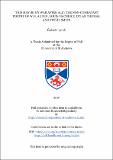Files in this item
'This may be my war after all' : the non-combatant poetry of W.H. Auden, Louis MacNeice, Dylan Thomas, and Stevie Smith
Item metadata
| dc.contributor.advisor | Mackay, Peter | |
| dc.contributor.author | Lynch, Éadaoín | |
| dc.coverage.spatial | vi, 263 p. | en_US |
| dc.date.accessioned | 2018-11-28T12:14:34Z | |
| dc.date.available | 2018-11-28T12:14:34Z | |
| dc.date.issued | 2018-06-26 | |
| dc.identifier.uri | https://hdl.handle.net/10023/16566 | |
| dc.description.abstract | This research aims to illuminate how and why war challenges the limits of poetic representation, through an analysis of non-combatant poetry of the Second World War. It is motivated by the question: how can one portray, represent, or talk about war? Literature on war poetry tends to concentrate on the combatant poets of the First World War, or their influence, while literature on the Second World War tends to focus on prose as the only expression of literary war experience. With a historicist approach, this thesis advances our understanding of both the Second World War, and our inherited notions of ‘war poetry,’ by parsing its historiography, and investigating the role critical appraisals have played in marginalising this area of poetic response. This thesis examines four poets as case studies in this field of research—W.H. Auden, Louis MacNeice, Dylan Thomas, and Stevie Smith—and evaluates them on both their individual explorations of poetic tone, faith systems, linguistic innovations, subversive performativity, and their collective trajectory towards a commitment to represent the war in their poetry. The findings from this research illustrate how too many critical appraisals have minimised or misrepresented Second World War poetry, and how the poets responded with a self-reflexivity that bespoke a deeper concern with how war is remembered and represented. The significance of these findings is breaking down the notion of objective fact in poetic representations of war, which are ineluctably subjective texts. These findings also offer insight into the ‘failure’ of poetry to represent war as a necessary part of war representation and prompt a rethinking of who has the ‘right’ experience—or simply the right—to talk about war. | en_US |
| dc.language.iso | en | en_US |
| dc.publisher | University of St Andrews | |
| dc.subject | War | en_US |
| dc.subject | War poetry | en_US |
| dc.subject | Second World War | en_US |
| dc.subject | First World War | en_US |
| dc.subject | Second World War poetry | en_US |
| dc.subject | Poetic representation | en_US |
| dc.subject | Non-combatant | en_US |
| dc.subject | Non-combatant poetry | en_US |
| dc.subject | Poetic influence | en_US |
| dc.subject | War experience | en_US |
| dc.subject | Historiography | en_US |
| dc.subject | Poetic tone | en_US |
| dc.subject | Ethics of representation | en_US |
| dc.subject | War representation | en_US |
| dc.subject.lcc | PR605.W66L86 | |
| dc.subject.lcsh | War poetry, English--History and criticism | en |
| dc.subject.lcsh | English poetry--20th century--History and criticism | en |
| dc.subject.lcsh | World War, 1939-1945--Poetry | en |
| dc.subject.lcsh | World War, 1914-1918--Poetry | en |
| dc.subject.lcsh | Civilians in war | en |
| dc.subject.lcsh | Auden, W. H.|q(Wystan Hugh), 1907-1973--Criticism and interpretation | en |
| dc.subject.lcsh | MacNeice, Louis, 1907-1963--Criticism and interpretation | en |
| dc.subject.lcsh | Thomas, Dylan, 1914-1953--Criticism and interpretation | en |
| dc.subject.lcsh | Smith, Stevie, 1902-1971--Criticism and interpretation | en |
| dc.title | 'This may be my war after all' : the non-combatant poetry of W.H. Auden, Louis MacNeice, Dylan Thomas, and Stevie Smith | en_US |
| dc.type | Thesis | en_US |
| dc.contributor.sponsor | Buchanan Scholarship | en_US |
| dc.contributor.sponsor | University of St Andrews. School of English. Professor A F Falconer PhD Scholarship | en_US |
| dc.type.qualificationlevel | Doctoral | en_US |
| dc.type.qualificationname | PhD Doctor of Philosophy | en_US |
| dc.publisher.institution | The University of St Andrews | en_US |
| dc.identifier.doi | https://doi.org/10.17630/10023-16566 |
This item appears in the following Collection(s)
Items in the St Andrews Research Repository are protected by copyright, with all rights reserved, unless otherwise indicated.

